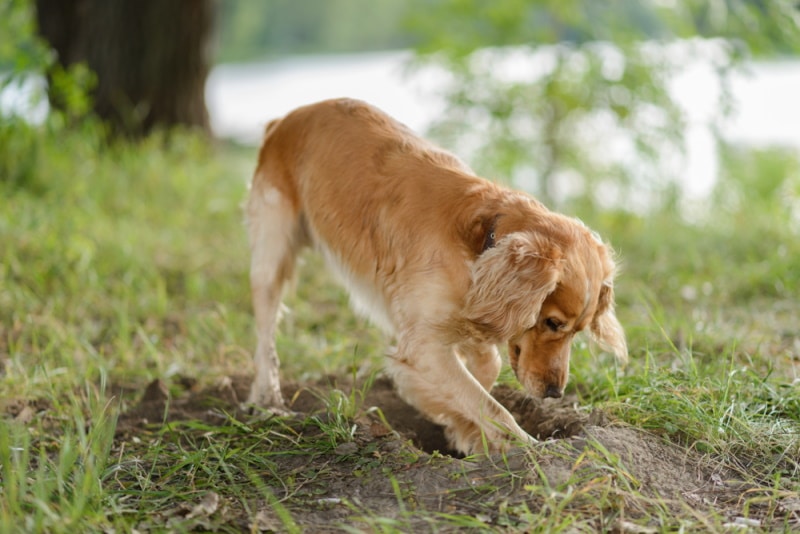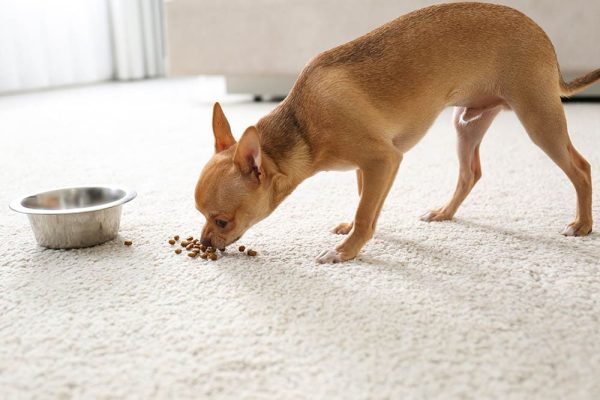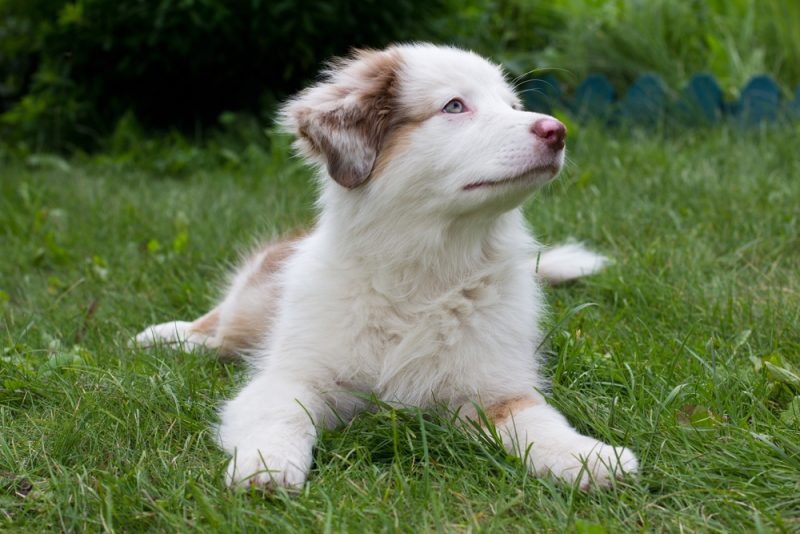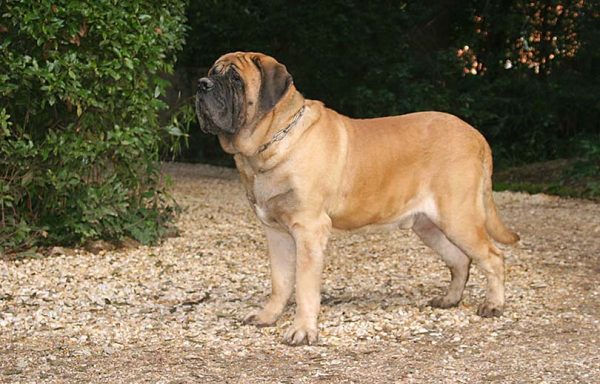In this article
View 3 More +A lot of dogs love to dig, but while it can feel like they are doing it just to ruin your perfectly landscaped flower bed or to wreak this year’s lettuce harvest, it isn’t a personal attack. More likely, your dog is bored or wants attention. It may even be suffering anxiety, or it could be digging because it finds it fun.
Being a natural behavior, you are far more likely to succeed if you think about redirecting it towards a healthy and less destructive outlet, rather than stopping it completely. Dogs respond much better if we give them the scenario of: Do this instead of that, rather than just: Don’t do that.
Before you start to implement ways to deter your digging dog, it’s worth taking a look at where they’re digging, in case there’s actually something triggering the behavior, like something on the other side of a fence, something buried in the ground, or even living in the soil. A dog can sense a burrowing animal deep underground, and some are even known to detect insects like termites, so it’s worth doing a bit of reconnaissance first.

The 9 Effective Ways to Stop Your Dog From Digging
1. Increase Your Dog’s Exercise
Dogs need exercise, especially dogs that are prone to digging. These working dogs can run for hours and if they don’t get enough exercise, they will look for ways to expend more energy and get rid of pent-up frustration. Digging is a physical activity and something that dogs enjoy.
Get the leash on and go for a walk or throw a ball around the garden, giving them a different way to use that energy.
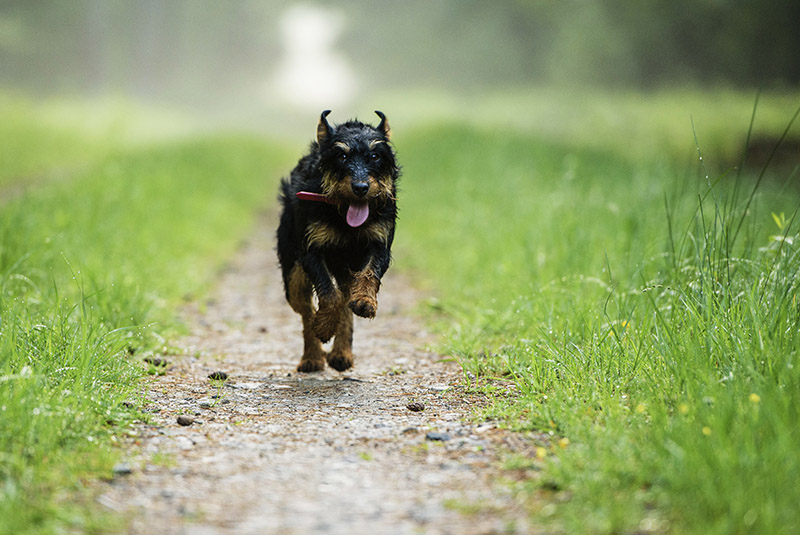
2. Diversify the Exercise
As well as walks, look for other methods of exercise. A long walk will tire some dogs out, but if you have a Border Collie, no matter how quickly and how far you’re walking, it won’t be enough to wear your herding dog out, because their exercise should be mentally stimulating, as well as physically.
You could sign up for herding events, although if you don’t have the time to dedicate to teaching herding, flyball is a good alternative that active breeds especially enjoy. You can even train your dog to run with you or let them spend time in the local dog park playing with other dogs: anything to burn off more energy.
3. Teach Basic Commands
Training not only enables you to teach basic commands like sit, leave, and come, but it also encourages your dog to use their brain. While some dogs dig because they have a lot of pent-up physical energy, some dig because they are not getting enough mental stimulation. Go to puppy classes with your young dog.
You will learn basic commands and how to teach your dog positive behaviors. Use positive reinforcement and distractions so that when they dig, you can encourage them to do something else and then reward that behavior. You can also train the stop command and reward your dog for stopping digging.
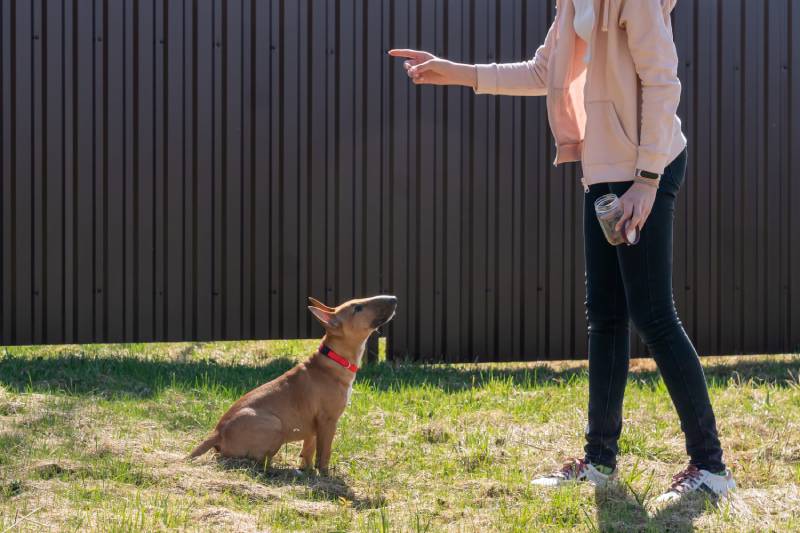
4. Expand That Training
As well as taking your dog to puppy classes, you need to continue the training at home. Set aside ten minutes every day specifically to work on the commands you learn during puppy classes and to teach new commands.
Training will continue throughout their lives, especially with the use of commands like sit and stay, but dedicating some time every day means you can enjoy more advanced training. By continuing to work on training, your dog not only learns more commands and uses its brain more, but it also has a clearer understanding of what you expect and what you mean. You will both get into good training habits, and you will benefit in the long run.
5. Provide Toys
A bored dog is prone to exhibiting unwanted behavior. They look to create their own activities and make their own fun, which can include digging in the garden as well as other activities that might be frowned upon in your home. Walking and exercising your dog can reduce some of that boredom while providing mental stimulation as well as physical exercise, but toys will provide entertainment even when you’re not available for activities.
Simple toys like stuffed animals and balls can be good, but interactive toys and puzzles are especially useful for intelligent dogs. You can also buy toys specifically for dogs that dig. These generally have layers, flaps, and pockets that can be used to hold treats and other items, so your dog is encouraged to use their noses to find the items and their paws to dig them up.
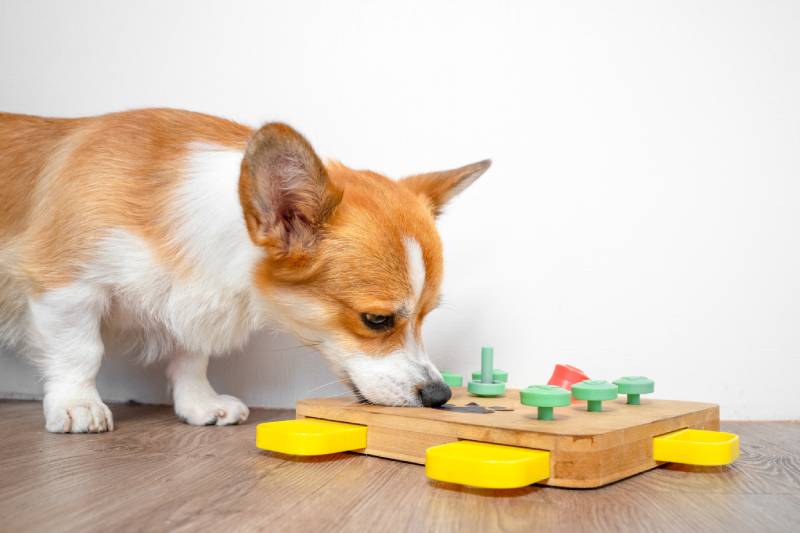
6. Install Fences
If there’s a specific area of the garden you don’t want your dog to dig, erect fencing. The physical barrier will prevent your dog from getting into the area which means they won’t be able to dig anything up. For some breeds, the fences will have to be tall. Jack Russells can jump up to 5 feet and they are good at scrambling up using slats and other potential platforms.
Even if you build a fence tall enough, don’t forget that you’re attempting to stop your dog from digging, so you will need to ensure that the fence goes deep enough to prevent your pup from digging under it and getting through to the other side.
7. Use Deterrents
If you don’t want to put a fence up, use deterrents. Dogs don’t like certain smells, like citrus. Consider spraying the flower beds you’re protecting with a citrus spray or plant plants and shrubbery that naturally deter dogs, such as lavender. You can also put citrus-scented plants around the area to act as further deterrents.

8. Change the Ground Cover Material
Sand and soil are soft and easy to dig. Slate, gravel, and even wood chips are uncomfortable to dig so they should deter your dog from even trying to excavate the area. However, you do need to be careful to ensure that your dog doesn’t injure its paws when it first tries to dig at the same spot.
Avoid pine needle mulch as the needles can cause serious impaction if swallowed by your mischievous pup, or cause infection if they dig into their pads or nails. You should also avoid cocoa bean mulch because cocoa beans are toxic to dogs and cats, so it could cause serious problems for your pets.
9. Offer a Digging Area
If your dog loves to dig, and you have the room, you could offer a safe digging spot. This is basically like adding a sand pit for your dog. Bury toys and treats in the sand and train your dog so they learn that it is acceptable to dig in that area but not in others. Sand and soil are good substrates for the digging pit. They are soft on paws and easy to move around.
When burying toys, especially at first, make sure you don’t bury them too deep. Over time, though, your dog’s sense of smell will improve, and they will understand that there might be treats so they will get better at locating whatever you hide.

What About Other Deterrents Like Shock Collars?
The trouble with using techniques like shock collars is that they produce a negative stimulus which can lead to stress, anxiety, and frustration. Rather than putting a stop to your dog’s digging, they are more likely to increase the behavior or force your dog to turn to other activities to fill that need. Digging is a natural canine behavior, so rather than trying to stop it completely, the most successful method is to find a way to redirect the energy in a way that you can reward.
Why Do Dogs Dig?
There are a lot of possible causes of digging behavior in dogs. Some breeds are more likely to dig so if you own a Jack Russell, for example, you are more likely to encounter this behavior. However, lots of dogs like to dig and possible reasons include boredom, anxiety, or simply because it’s a fun activity. Your dog might dig to get a reaction out of you, or because there’s something they’re trying to get to.
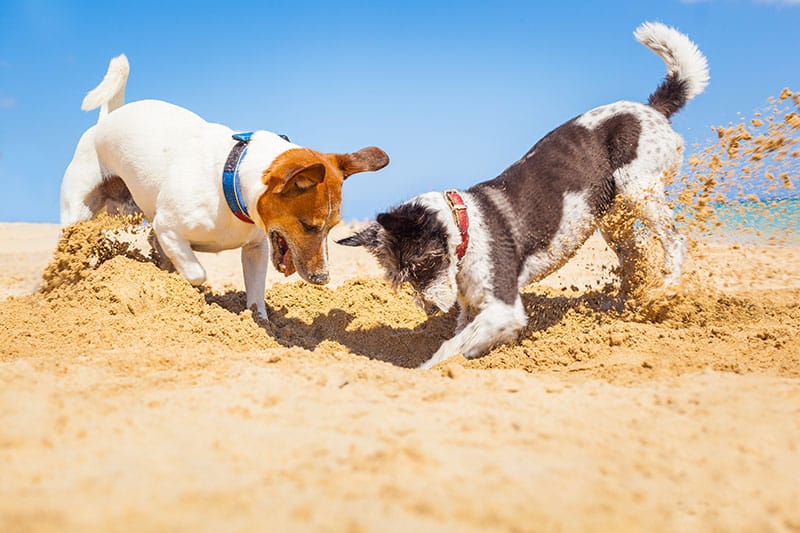
Do Dogs Grow Out of Digging?
Some dogs might grow out of digging as they age, but it isn’t necessarily just a puppy phase. Ensure you follow the steps above, offering plenty of exercise and enrichment while working on training and using distractions and positive reinforcement, and you should be able to stop a puppy digging before it grows up to be an adult digger.

Conclusion
Digging is a fun activity for a lot of dogs, but it isn’t fun for you if you have to replace flowers or lawns regularly. Use the methods above to try and deter your dog from digging up your garden.
Find the root cause of the digging, whether it is an instinctive behavior that is typical of the breed or the fact your dog is bored and has a lot of unused energy. Then look for ways to counteract this while also putting up barriers or using other methods to stop the digging itself, but make sure you are providing them with something else to do in return.
See Also:
Featured Image Credit: Photopen, Shutterstock

